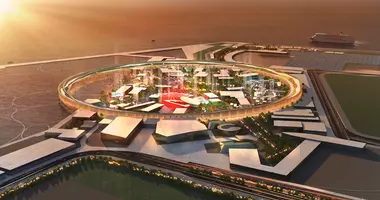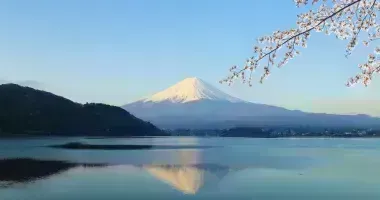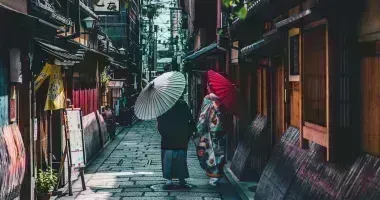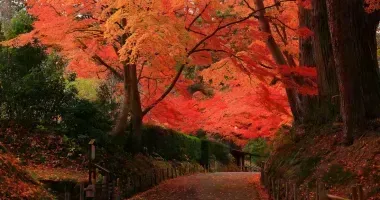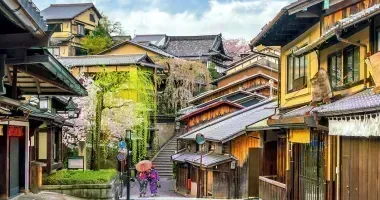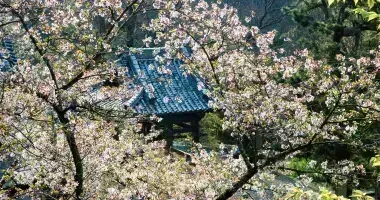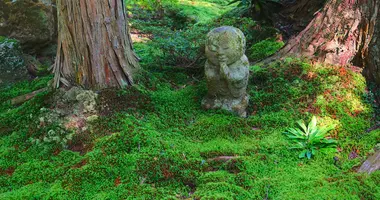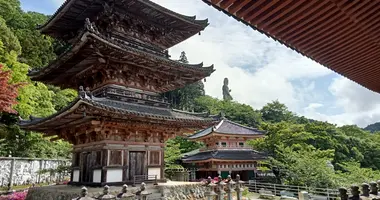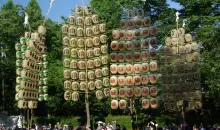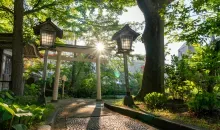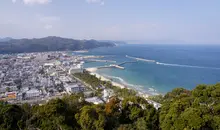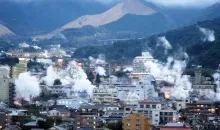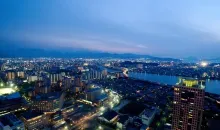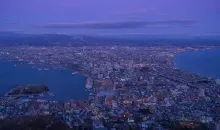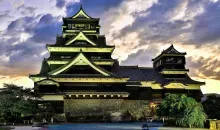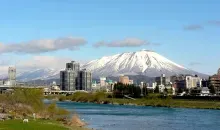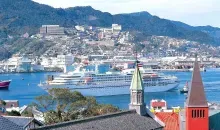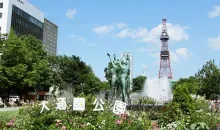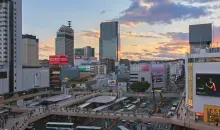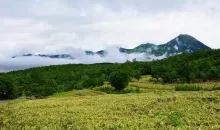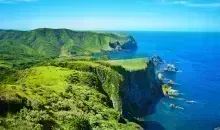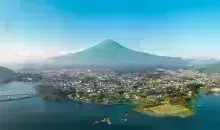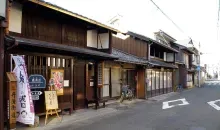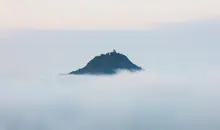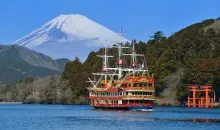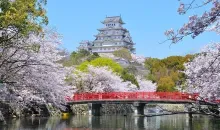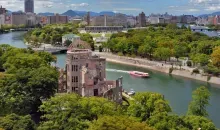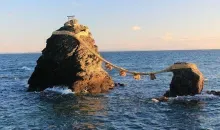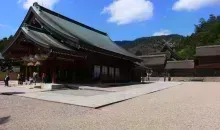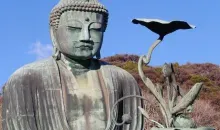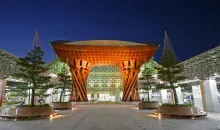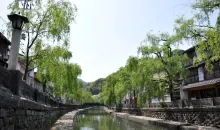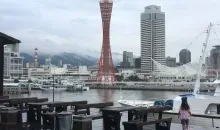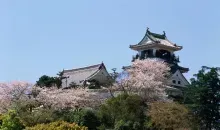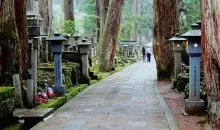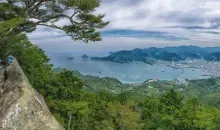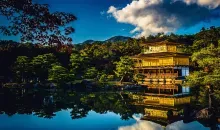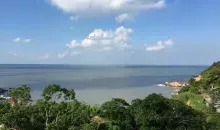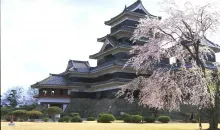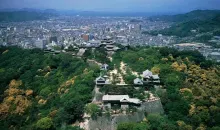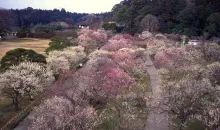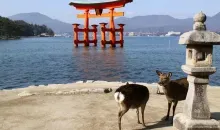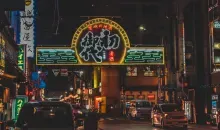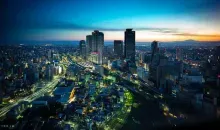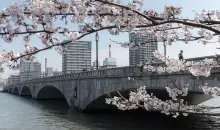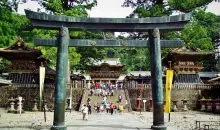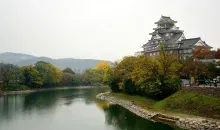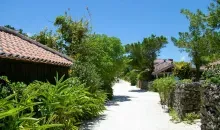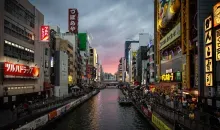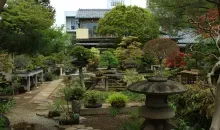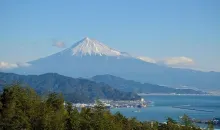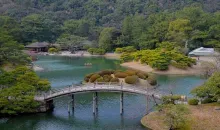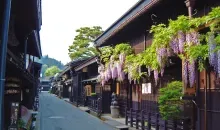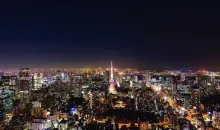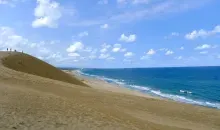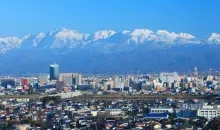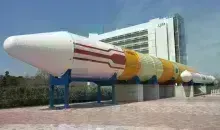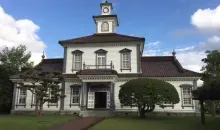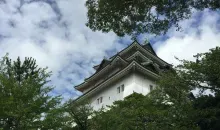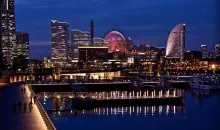Discover Kagoshima
- Published on : 01/12/2021
- by : G.L. / J.R.
- Youtube
Local Time 08:57
Symbol : sunny_cloudy
Temp : 24.6°C
Date : Today
Symbol : cloudy_rainy
Temp : 27°C
Date : Tomorrow
Symbol : cloudy_rainy
Temp : 26.8°C
Date : Thursday
Symbol : sunny
Temp : 24.9°C
Date : Friday
Local Time 08:57
Symbol : sunny_cloudy
Temp : 24.6°C
Date : Today
Symbol : cloudy_rainy
Temp : 27°C
Date : Tomorrow
Symbol : cloudy_rainy
Temp : 26.8°C
Date : Thursday
Symbol : sunny
Temp : 24.9°C
Date : Friday
Kagoshima, the Naples of the East
Located at the southern tip of mainland Japan, Kagoshima is nicknamed the "Naples of the East" for its pleasant climate and magnificent bay dominated by the Sakurajima volcano. This fascinating prefecture boasts impressive volcanic landscapes, paradise islands such as Yakushima and Amami-Oshima, age-old cultural traditions and a unique gastronomy. Between sea and mountains, this region offers a compendium of everything that makes Japan so charming, far from the traditional tourist trails. Let yourself be seduced by this land where bubbling nature coexists with a rich historical heritage and warm-hearted inhabitants who perpetuate centuries-old traditions.
Getting to Kagoshima and around the region
Getting to Kagoshima is now very simple thanks to the well-developed transport network serving this southern prefecture. Several options are available to travelers wishing to discover this captivating region of southern Kyushu.
By train, Kagoshima is connected to the shinkansen-Kyushu network, providing easy access from major Japanese cities. From Fukuoka (Hakata station), it's an 80-minute shinkansen journey to Kagoshima-Chûô main station. This journey is fully covered by the Order your Japan Rail Pass for unlimited train travel. Some shinkansen even connect Shin-Osaka and Kagoshima directly in around 4 hours, with no need to change trains.
If you prefer to fly, Kagoshima airport offers regular flights from major Japanese cities such as Tokyo, Nagoya and Osaka. Several airlines, some of them low-cost (ANA, Jetstar, Peach), serve this airport. Once at the airport, a bus will take you to Kagoshima-Chûô station in around 40 minutes.
To get around the city, Kagoshima has an efficient public transport network comprising streetcars, local buses and trains. The streetcar is particularly convenient for exploring the city center. A Kagoshima City Tram One-day Pass is recommended for optimum mobility.
To visit the surrounding area and islands, several options are available. Regular ferries link the city to neighboring islands, including Sakurajima (only 15 minutes crossing), Yakushima and Amami-Oshima. Car rental is also an excellent option for exploring the prefecture freely, especially if you want to venture into rural areas or explore the whole island of kyushu with our "kyushu cult" car tour.
Natural highlights: volcanoes, national parks and islands
Kagoshima Prefecture is a true paradise for nature lovers, offering a breathtaking diversity of landscapes, from volcanic mountains to tropical islands.
Mount Sakurajima is undoubtedly Kagoshima's natural landmark. This exceptionally active volcano rises majestically in the middle of Kinko Bay. It last erupted in 1914, but remains one of the world's most active Japanese volcanoes, regularly spewing ash and smoke. To get closer, take a ferry from Kagoshima harbour (15 minutes, 150 yen) and opt for a Sakurajima Volcano Walk. On site, you can rent a car, scooter or bicycle to tour this volcanic peninsula. Don't miss the Yunohira observatory, the highest accessible point offering panoramic views.
Kirishima-Kinkō National Park, established in 1934, is Japan's oldest national park. It includes more than 20 active volcanoes in a variety of shapes, earning it the nickname "museum of volcanoes". The Ebino Plateau is an excellent starting point for exploring this fascinating region. Among the most popular hikes, the ascent of Mount Karakuni (1700 meters) offers spectacular views of Mount Sakurajima and Kinkō Bay. Mount Takachiho, considered the most beautiful in the park, is steeped in history and legend. It is also home to Lake Mi, the largest crater lake in the region.
The Amami archipelago, in southwest Kyushu, is part of the larger Ryukyu archipelago. Its subtropical climate and coral reefs attract many water sports enthusiasts. The island of Amami Oshima is particularly recommended, with its pristine beaches and subtropical forests soon to be declared a UNESCO World Heritage Site.
Yakushima Island, a UNESCO World Heritage Site, is a must-see destination for nature lovers. This island, 90% of which is covered by lush forests, is home to thousand-year-old cedars, including the famous Jōmon Sugi, estimated to be over 7,000 years old. The island's unique ecosystem is home to native species such as the Japanese macaque and the Yaku deer. Don't miss the Ohko-no-taki waterfall, one of the highest in Japan, and Nagata Inakahama beach, where sea turtles can be seen between May and July.
Kagoshima's historical and cultural heritage
Kagoshima has a rich historical and cultural heritage, deeply linked to the evolution of modern Japan. This region, once known as the Satsuma stronghold, played a crucial role in Japanese history.
Kagoshima's history dates back to 1549, when the Jesuit missionary François Xavier landed in the small port to evangelize the archipelago. But it was not until the 19th century that the region came to play a key role in Japanese history. Under the impetus of Lord Nariakira Shimazu, who was passionate about science and European culture, Kagoshima became a center of innovation. The Shôko Shûsei-kan, Japan's first modern factory, was founded to produce firearms and ships. Now a museum, this UNESCO World Heritage site boasts a vast collection of objects relating to the Satsuma clan and the art of cut glass.
The region is also famous for the Satsuma Revolt of 1877, led by Saigo Takamori against the reforms of the Meiji era. This great samurai, considered a national hero, committed suicide on Shiroyama Hill after the defeat of his troops at Kumamoto Castle. The Meiji Restoration Museum offers a fascinating insight into this tumultuous period.
Among the historical sites not to be missed, the Sengan-en Garden occupies pride of place. Built in 1658 by the Shimazu clan, this magnificent Japanese garden is home to tropical plants and offers a breathtaking view of the Sakurajima volcano. Villa Goten, former home of the Shimazu clan, is also worth a visit to understand the lifestyle of the local aristocracy.
Don't miss the Terukuni-jinja shrine, recognizable by its unique roof in the shape of a bird in flight. Erected in honor of Shimazu Nariakira, this shrine bears witness to the importance of this leader who opened up the region to Western influences.
For military history buffs, Chiran offers a double attraction: its Edo-era samurai houses with their magnificent dry gardens, and its museum dedicated to the kamikaze pilots of the Second World War, featuring poignant letters and personal effects from these young soldiers.
Onsen and thermal baths: a local speciality
Thanks to its intense volcanic activity, Kagoshima Prefecture is richly endowed with natural hot springs, making onsen (thermal baths) a regional specialty particularly appreciated by visitors and locals alike.
The town ofIbusuki, about an hour south of Kagoshima, is famous throughout Japan for its unique sand baths known as "sunamushi". This ancient practice involves lying on the beach and being covered up to the neck in black sand heated naturally by geothermal energy. The temperature of the sand can reach 50-55°C, creating an intense sweating experience believed to purify the blood and relieve various ailments. A typical session lasts around 10-15 minutes, before cooling off in a traditional onsen. The Sayuri complex, named after the heroine of the novel "Memoirs of a Geisha", is one of the most renowned establishments for this experience.
In the Kirishima region, renowned for its spectacular volcanic landscapes, lies one of Japan's largest concentrations of onsen. There are over a dozen different hot springs, each with its own therapeutic properties. Kirishima's onsen are particularly recommended in winter, when you can immerse yourself in warm water while gazing at the snow-capped mountains. Among the most popular, Kirishima Onsen offers baths in sulfurous waters reputed to relieve joint pain and skin problems.
On the volcanic island of Sakurajima, don't miss Furusato Onsen. This mixed outdoor hot spring offers a breathtaking view of the bay while you relax in its healing waters. Admission costs around 1050 yen, a modest price for the exceptional experience of bathing with a direct view of one of Japan's most active volcanoes.
Yakushima Island is also home to some unique onsen, including the Hirauchi Sea Onsen hot spring. This natural bath dug into the rock by the sea is only accessible for two hours a day at low tide. The experience of bathing in natural hot water while listening to the ocean waves is truly memorable.
For a more urban experience, many hotels in Kagoshima offer their own spa facilities, often located on the upper floors to offer panoramic views of the bay and Mount Sakurajima. The Shiroyama Hotel is particularly renowned for its onsen with a view.
Kagoshima gastronomy: shochu, black beef and regional specialties
Kagoshima prefecture is a region with an exceptional culinary heritage, shaped by its subtropical climate, fertile volcanic soils and history. Discovering Kagoshima inevitably involves tasting its unique gastronomic specialties.
Kurobuta (literally "black pig") is Kagoshima's signature meat speciality. These black-skinned Berkshire pigs produce exceptionally tender, juicy and flavorful meat, often compared to wagyu beef for its quality. You can enjoy this meat in a variety of ways: shabu-shabu (thin slices boiled quickly), tonkatsu (breaded chop) or tonkotsu (stew). The Ichiniisan restaurant in Tenmonkan is an excellent place to discover this specialty in an authentic setting.
Kagoshima black beef (Kagoshima kuro-ushi) is another of the region's gastronomic jewels. These wagyu cows bred under the Kagoshima sun produce exceptionally tender meat, with balanced marbling that literally melts in the mouth. This premium meat is often served as yakiniku (Japanese barbecue) or steak.
Shochu is Kagoshima's internationally recognized traditional spirit, comparable to Bordeaux wine or Cognac brandy. Unlike sake (fermented), shochu is a distilled spirit, usually made from sweet potatoes (imo-jōchū), although other varieties are produced from rice (kome-jōchū) or barley (mugi-jōchū). With over 113 distilleries producing some 1,500 different brands, Kagoshima is truly the shochu capital of Japan. The drink, generally between 25% and 45% alcohol, can be enjoyed neat, on the rocks, diluted with hot water (oyuwari) or cold water (mizuwari).
Satsuma-age are delicious fried fish cakes, a must-try speciality of the region. Made from a mixture of minced fish (often sardines, shark, bonito or mackerel), bound with flour and starch, then seasoned, these fritters are perfect as an aperitif or side dish. They're easy to find in local markets and traditional restaurants.
Karukan is a traditional delicacy made from rice flour, sugar and grated Japanese mountain yam. This soft cake with its subtle sweetness comes in two shapes: rectangular (plain) or round (with a sweet red bean filling). Originating from the Edo period, this specialty was once offered to the local lord. Today, it is enjoyed with a cup of green tea.
Gane, less well known but just as delicious, are fritters made from satsuma imo (sweet potatoes), carrots and spring onions. These tempura-like fried foods are a tasty and typical snack that can be enjoyed in local restaurants such as Kirishima Fumoto no Eki.
Finally, seafood lovers will be delighted by the sashimi of kibinago (round herring with silver stripes), a delicate fish served with a spicy sauce, as well as by the many preparations based on smoked eel, amberjack and other fresh fish caught in the waters surrounding the prefecture.
Traditional crafts: Satsuma ceramics and Oshima silk
Kagoshima is a veritable treasure trove of traditional crafts, perpetuating ancestral techniques that bear witness to the creativity and skill of local artisans. Two crafts in particular stand out: Satsuma ceramics and Oshima silk.
Satsuma ceramics (Satsuma-yaki) are one of Kagoshima's most prestigious craft traditions. This name encompasses a wide variety of porcelains produced since the 16th century. The history of this craft dates back to 1598, when Korean potters were brought to Satsuma by the local lord after Japanese military campaigns in Korea. These craftsmen developed a unique style, characterized by fine, creamy porcelain, decorated with detailed motifs and often enhanced with gold. Satsuma ceramics are distinguished by two main styles: Shiro-Satsuma (white) and Kuro-Satsuma (black).
Today, you can admire and purchase these magnificent creations in several workshops in the region, where craftsmen perpetuate these traditional techniques. Some even offer demonstrations and workshops to introduce visitors to this ancient art.
Satsuma cut glass (Satsuma Kiriko) is another of the region's exceptional crafts. Born during the Edo era, this art is characterized by colored glass pieces decorated with geometric motifs inspired by foreign cultures, notably European. After disappearing for a hundred years due to local wars, this technique was resurrected in 1985 by determined craftsmen who studied documents and period pieces.
At the Bîdoro Kôgei glassworks in Satsuma village, visitors can learn about the manufacturing process and even try their hand at the technique. Today, seven workshops employ around a hundred craftsmen who produce pieces in a variety of colors (red, blue, green, violet, yellow, orange), perpetuating this exceptional cultural heritage.
Tsumugi silk from Oshima is perhaps Kagoshima's most precious craft treasure. Produced on the island of Amami-Oshima using 1300-year-old techniques, this silk is distinguished by its unique dyeing process using mud and bark. The manufacturing process is so complex and meticulous that it can take up to a year to produce a single roll of fabric.
This exceptional, wrinkle-resistant textile is traditionally used to make top-of-the-range kimonos. At Amami Oshima's Oose Shoten workshop, you can watch craftsmen at work on their traditional looms and even try your hand at weaving. The Takakura, a traditional elevated warehouse on the island, houses an impressive collection of Oshima Tsumugi kimonos for you to admire and even try on.
These handicrafts testify not only to the exceptional skill of Kagoshima's craftsmen, but also to their determination to preserve a priceless cultural heritage for future generations.
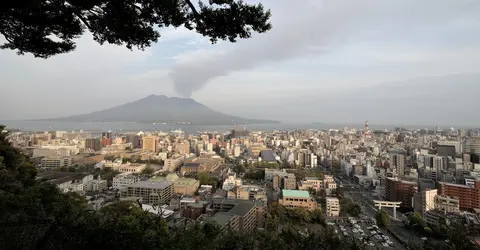
View of Kagoshima and Sakurajima
Flickr Steffen Flor
Explore Kagoshima by season
Kagoshima offers a variety of experiences throughout the year, with each season revealing a different aspect of this fascinating prefecture. Here's a seasonal guide to help you plan your visit according to your preferences.
Spring (March to May) is undoubtedly the most pleasant time to visit Kagoshima. Temperatures are mild (between 13°C and 24°C) and rainfall moderate. It's cherry blossom season, particularly spectacular around the ruins of Tsurumaru Castle (Kagoshima Castle). Kareigawa station, one of the oldest in Japan still in service, is also a popular place to admire the cherry blossoms in late March/early April. Spring is also the best time to visit Yakushima Island, as it rains less than usual.
Summer (June to August) in Kagoshima is hot and humid, with temperatures that can exceed 30°C. June is the rainiest month (with around 454mm of precipitation), but July and August offer more sunny days. This is the ideal season to enjoy beaches and water sports, especially on the Amami archipelago, where you can dive, snorkel and surf. Summer is also the time to watch sea turtles lay their eggs on Nagahata Inakahama beach in Yakushima, Japan's largest sea turtle nesting site.
Autumn (September to November) is another ideal time to visit Kagoshima, with pleasant temperatures (between 15°C and 25°C) and moderate rainfall. Autumn foliage creates magnificent landscapes, particularly in Kirishima National Park, where the contrast between the deep blue of the lakes and the warm colors of the trees is striking. This is also the period when tens of thousands of cranes invade the Izumi Crane Observation Center, home to the largest number of migratory cranes in Japan.
Winter (December to February) in Kagoshima is mild compared with the rest of Japan, with temperatures rarely below 5°C in the lowlands. It's the ideal time to relax in the soothing waters of the onsen, particularly those in Kirishima, home to over a dozen different hot springs. Winter is also the perfect time to visit Ibusuki Onsen and enjoy its steaming sand baths. From the beach, the view of Mount Kaimondake, also known as Satsuma Fuji, is particularly beautiful. On the Ebino plateau, winter sports enthusiasts can enjoy a large natural ice rink.
Whatever the season of your visit, Kagoshima offers unforgettable experiences, from natural discoveries to cultural immersion and gastronomic delights. This southern prefecture, still untouched by mass tourism, will reveal its treasures as the seasons go by, inviting you to return and explore every facet. So, when will you set off to discover this fascinating Japanese region?
Our tours in Discover Kagoshima
Interested by Discover Kagoshima
Discover other cities to explore







